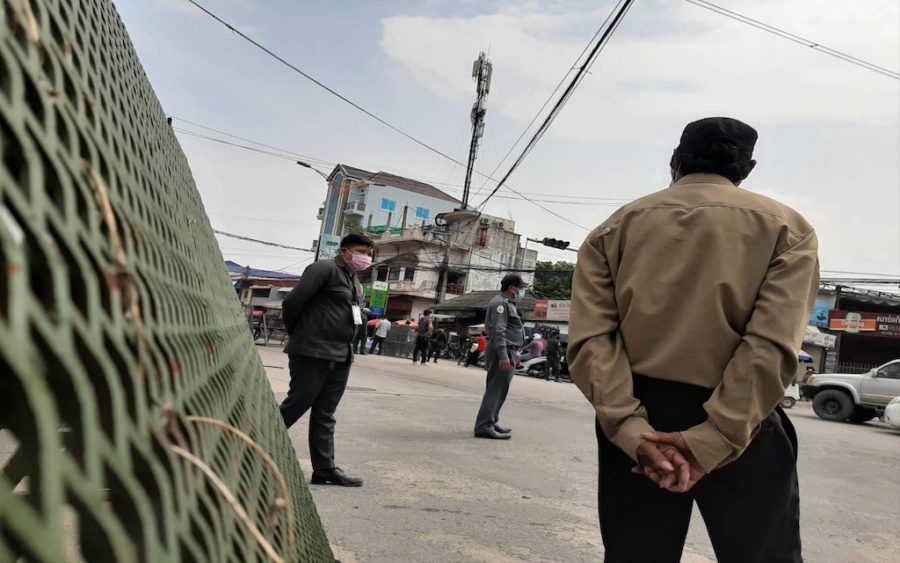More than 1,600 workers from 206 factories have tested positive across the country, the government said at a press conference Wednesday, with thousands of others placed in quarantine.
The government designated three communes in Meanchey district and one each in Pur Senchey and Russei Keo districts as “red zones,” which has led to the closing down of factories and stringent restrictions on movements. The communes are dense with factories and worker housing.
Labor Ministry spokesperson Heng Sour said 134 factories in Phnom Penh were affected by the outbreak, 23 in Kandal, 26 in Takeo and the rest in four other provinces. The spokesperson was speaking at a press conference following the creation of a tricolor zoning system to control the spread of Covid-19.
He said the creation of a yellow zone — which allows most businesses to reopen and for people to resume work — would mean that 60 factories could restart production.
“Some businesses in the yellow zone can reopen and there can be movement of the workers from one area to another area,” he said.
Factory workers in Meanchey district, who have been in a red zone for the past 10 days, have told VOD they are unable to access food or didn’t have money to buy food. Some “red zone” residents had received food donations from the government, private firms and individuals.
Phnom Penh’s case count started to rise significantly after hundreds of cases were detected in early April at Din Han Enterprise, which is an Adidas supplier, in Meanchey district.
“We have to understand that the lockdown is a hurtful thing. It is a thing where we have experienced difficulties together,” Sour said at the press conference.
He said the lockdown in Phnom Penh and Takhmao city in Kandal covered 690 factories and more than 1.2 million workers. The spokesperson added that 110,000 workers had received their first dose of a Covid-19 vaccine, with 10,000 workers fully inoculated.
The government has made factory workers a priority group in its vaccination drive and announced plans to inoculate all residents living in “red zones.”
Samaun Kantha, who was a part-time factory worker without a contract getting paid by the hour, is currently in a red zone in Pur Senchey district. She has faced difficulty getting food and has no income to support her son and parents who live in Kampong Thom province.
“I am feeling sad and I wish to be allowed to work so that I can find a job,” Kantha said.
“Sometimes, I almost cry while sleeping. Also, I can’t go back home and just stay in the room while the money keeps running out.”
The Garment Manufacturers Association in Cambodia released a statement on April 22 and referred to a Labor Ministry notice from April 19 that said workers were not obligated to “fulfill their work duty” and employers didn’t have to pay wages during a period of contract suspension.
But the influential employer group asked factories to consider giving cash allowances to workers to support their daily lives.
“This is in addition to all the other support offered by the Royal Government in order to support their daily lives until the lockdown period ends,” the statement reads.
Another factory worker, Met Somuntha, is sharing a room with three other workers in Choam Chao I commune, which is designated a red zone. The 22-year-old worker works at Dilux factory and has stopped working since April 10.
She had some rice in stock but was worried about running out of food, and had not received any support from the government.
Somuntha said, “It is a bit hard because [the outbreak] is widespread and there are a lot of workers in factories. So we don’t know who is infected [with Covid-19].”
She was worried the outbreak would linger and that workers would return to work eventually, but “with fear.”
Ath Thorn, president of the Cambodian Labor Confederation, said it was concerning that workers were worst affected by the outbreak, putting at risk their health and livelihoods.
“What we are worried about the most is that more than a thousand workers could have been in contact with hundreds of other workers who stay together, so it can cause a lot of issues for our workers,” he said.
He wanted the government to pay more attention to the health care provided to workers, adding that those who were being treated at home did not have access to ventilators or therapeutics if their condition worsened.
Additional reporting by Va Sopheanut













